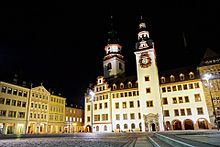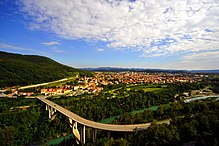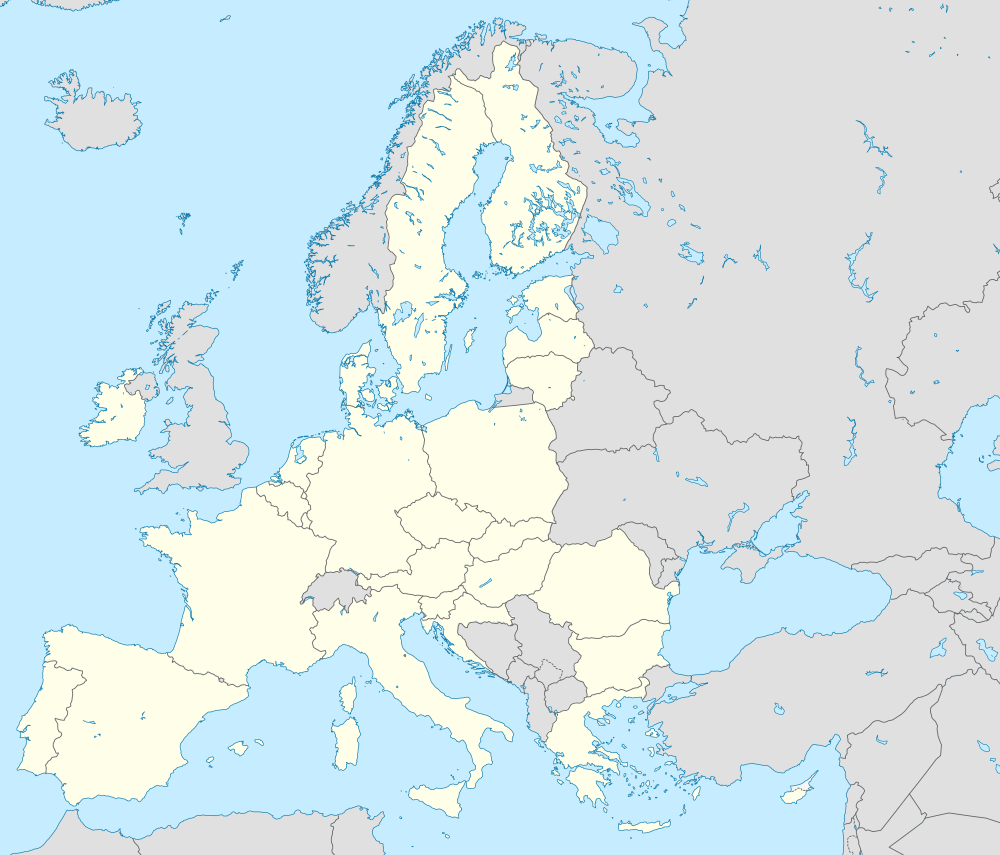



A European Capital of Culture is a city designated by the European Union (EU) for a period of one calendar year during which it organises a series of cultural events with a strong pan-European dimension. Being a European Capital of Culture can be an opportunity for a city to generate considerable cultural, social, and economic benefits, and it can help foster urban regeneration, change the city's image, and raise its visibility and profile on an international scale. Multiple cities can be a European Capital of Culture simultaneously.
In 1985, Melina Mercouri, Greece's Minister of Culture, and her French counterpart Jack Lang came up with the idea of designating an annual City of Culture to bring Europeans closer together by highlighting the richness and diversity of European cultures and raising awareness of their common history and values.
The Commission of the European Union manages the title, and each year the Council of Ministers of the European Union formally designates European Capitals of Culture: more than 60 cities have been designated so far. The current European Capitals of Culture for 2025 are Nova Gorica in Slovenia with Gorizia in Italy, and Chemnitz in Germany.
Selection process
An international panel of cultural experts is in charge of assessing the proposals of cities for the title according to criteria specified by the European Union.
For two of the capitals each year, eligibility is open to cities in EU member states only. From 2021 and every three years thereafter, a third capital will be chosen from cities in countries that are candidates or potential candidates for membership, or in countries that are part of the European Economic Area (EEA)– an example of the latter being Stavanger, Norway, which was a European Capital of Culture in 2008.
A 2004 study conducted for the Commission, known as the "Palmer report", demonstrated that the choice of European Capital of Culture served as a catalyst for cultural development and the transformation of the city. Consequently, the beneficial socio-economic development and impact for the chosen city are now also considered in determining the chosen cities.
Bids from five United Kingdom cities to be the 2023 Capital of Culture were disqualified in November 2017, because the UK was planning to leave the EU before 2023.
History
The European Capital of Culture programme was initially called the European City of Culture and was conceived in 1983, by Melina Mercouri, then serving as minister of culture in Greece. Mercouri believed that at the time, culture was not given the same attention as politics and economics and a project for promoting European cultures within the member states should be pursued.
The European City of Culture programme was launched in the summer of 1985 with Athens being the first title-holder. In 1999, the European City of Culture program was renamed to European Capital of Culture.
List of European Capitals of Culture
The European Capital of Culture was due to be in the UK in 2023. However, due to its decision to leave the European Union, UK cities would no longer be eligible to hold the title after 2019. The European Commission's Scotland office confirmed that this would be the case on 23 November 2017, only one week before the UK was due to announce which city would be put forward. The candidate cities were Dundee, Leeds, Milton Keynes, Nottingham and a joint bid from Northern Irish cities of Belfast and Derry and the town of Strabane.
A new framework makes it possible for cities in candidate countries (Albania, Bosnia and Herzegovina, Georgia, Moldova, Montenegro, North Macedonia, Serbia, Turkey, Ukraine), potential candidates for EU membership (Kosovo) or EFTA member states (Iceland, Liechtenstein, Norway, Switzerland) to hold the title every third year as of 2021. This will be selected through an open competition, meaning that cities from various countries may compete with each other.

See also
Portals:- American Capital of Culture – In the Americas, title awarded annually by American Capital of Culture, an NGO
- Arab Capital of Culture – Arab League effort to promote and celebrate Arab culture
- European Green Capital Award – Award for a European city based on its environmental record
- European Youth Capital – One year city award
- European Region of Gastronomy – Regional title
- UK City of Culture – Cultural designation in the United Kingdom
- University Network of the European Capitals of Culture – International non-profit association
References
- "Decision No 445/2014/EU of the European Parliament and of the Council of 16 April 2014". 3 May 2014. Archived from the original on 21 December 2017. Retrieved 24 November 2017.
- "European Capitals of Culture 2020 to 2033 — A guide for cities preparing to bid" (PDF). European Commission. Archived (PDF) from the original on 3 June 2019. Retrieved 24 November 2017.
- Palmer, Robert. "European Cities and Capitals of Culture" (PDF). ec.europa.eu. Archived from the original (PDF) on 5 April 2015. Study prepared for the European Commission
- "Brexit blow to UK 2023 culture crown bids". BBC News. 23 November 2017. Archived from the original on 26 March 2018. Retrieved 23 November 2017.
- Kiran Klaus Patel, ed., The Cultural Politics of Europe: European Capitals of Culture and European Union since the 1980s (London: Routledge, 2013)
- "History – UNeECC". Archived from the original on 17 July 2021. Retrieved 25 February 2021.
- chmc1 (5 December 2016). "From a divided city to a capital city : Berlin's cultural policy frameworks between 1945 and 2015". doi:10.58079/mreh.
{{cite web}}: CS1 maint: numeric names: authors list (link) - "Tanz im August | International Festival Berlin | Berlin - European Capital of Culture 1988". www.tanzimaugust.de.
- "Association of European Cities of Culture of the Year 2000 – KRAKOW THE OPEN CITY". krakow.pl. Archived from the original on 1 March 2021. Retrieved 25 February 2021.
- "Galway & Cork make culture shortlist". RTÉ. 10 September 2001. Retrieved 1 November 2024.
- "Liverpool named European capital of culture". The Guardian. 4 June 2003. Retrieved 1 November 2024.
- "Marseille named Europe's culture capital for 2013". France24. 16 September 2008. Retrieved 1 November 2024.
- "The European Capital of Culture in Spain in 2016 will be San Sebastián". euroalert.net. 29 June 2011. Retrieved 1 November 2024.
- "Wrocław Chosen as European Capital of Culture 2016". culture.pl. 28 June 2011. Retrieved 1 November 2024.
- "Sønderborg, Denmark: EU Capital of Culture 2017?". The Avid Cruiser. 13 March 2012. Retrieved 1 November 2024.
- "Nicosia and Paphos outbid Limassol for European Capital of Culture 2017". Cyprus Mail. 22 June 2011. Retrieved 1 November 2024.
- "Who What When Where Why: LF2018". The Northern Times. 11 June 2018. Retrieved 1 November 2024.
- "Matera to be 2019 European Capital of Culture in Italy". International Institute of Gastronomy, Culture, Arts and Tourism. 20 October 2014. Retrieved 1 November 2024.
- "Four cities shortlisted for Bulgaria's European Capital of Culture 2019". The Sofia Globe. 12 December 2013. Retrieved 1 November 2024.
- "Galway to be European Capital of Culture 2020". Visual Artists Ireland. 15 July 2016. Retrieved 1 November 2024.
- "The Final Shortlist of European Capital of Culture Announced". Council Journal. 24 November 2015. Retrieved 1 November 2024.
- "Kaunas is shortlisted for the title of European Capital of Culture 2022". Kaunas City Municipal administration. 27 June 2016. Retrieved 1 November 2024.
- "Eleusis 2023". Aeschylia Festival. Retrieved 1 November 2024.
- "Timisoara 2021". European Capitals of Culture Ποιειν Και Πραττειν - create and do. Retrieved 1 November 2024.
- "Veszprém formally named 2023 European Capital of Culture". Budapest Businesss Journal. 6 March 2019. Retrieved 1 November 2024.
- "FAQs". Salzkammergut 2024. Retrieved 1 November 2024.
- "Bodø recommended for the European Capital of Culture 2024 title beyond the EU". European Commission. Retrieved 5 November 2024.
- "Tartu win not a 'unanimous' decision for European Capital of Culture 2024". ERR.ee. 29 August 2019. Retrieved 1 November 2024.
- "Chemnitz to be European Capital of Culture 2025". DW. 28 October 2020. Retrieved 1 November 2024.
- "GO! 2025 - European Capital of Culture Nova Gorica-Gorizia 2025". GECT GO / EZTS GO. Retrieved 1 November 2024.
- "Oulu named European Capital of Culture 2026". The Barents Observer. 9 June 2021. Retrieved 1 November 2024.
- "Trenčín to be the European Capital of Culture 2026 in Slovakia". europa.eu. 10 December 2021. Archived from the original on 29 December 2021. Retrieved 29 December 2021.
- "Évora named 2027 European Capital of Culture". Portugual Resident. 7 December 2022. Retrieved 1 November 2024.
- "Liepaja is the European Capital of culture for 2027". EcocNews.com. 10 May 2022. Retrieved 1 November 2024.
- "Bourges to be the European Capital of Culture 2028 in France". European Commission. Retrieved 15 December 2023.
- "České Budějovice to be the European Capital of Culture 2028 in the Czech Republic". European Commission. Retrieved 1 July 2023.
- "Skopje 2028, is online the Panel's Decision". ecocnews.com. 31 October 2023. Retrieved 2 November 2024.
- "Kiruna becomes Europe's cultural capital: "Grateful"". Sweden Herald. Retrieved 7 December 2024.
- "Kiruna och Uppsala vill bli kulturhuvudstad". Kulturrådet (in Swedish). Retrieved 21 February 2024.
- "Lublin has been awarded the title of European Capital of Culture 2029!". White Mad. 25 September 2024. Retrieved 25 September 2024.
- "Lublin has been awarded the title of European Capital of Culture 2029!". White Mad. 25 September 2024. Retrieved 1 November 2024.
- https://cyprus-mail.com/2023/10/30/the-race-is-on-three-cities-bidding-for-eu-cultural-capital-2030/
- ^ "European Capital Of Culture 2030 Belgium". ECOC2030BE. Retrieved 25 October 2024.
- "Ecoc 2030, in shortlist Lviv (Ukraine) and Nikšić (Montenegro)".
- "European Capital of Culture 2031 Candidates".
- "Spain 2031, six cities want to be Ecoc". ecocnews.com. 21 July 2024. Retrieved 23 October 2024.
- "Vild plan: Vil gøre Næstved til europæisk kulturhovedstad". 11 January 2022. Archived from the original on 8 February 2022. Retrieved 8 February 2022.
- Steen, Paul van der (8 March 2023). "Heerlen wil culturele hoofdstad van Europa worden". NRC – via www.nrc.nl.
- "Torino Capitale europea della Cultura nel 2033? Il Consiglio comunale dice "sì" alla candidatura". Torino Oggi. 19 April 2021. Archived from the original on 21 April 2021. Retrieved 21 April 2021.
- "Pesaro e Urbino insieme per la candidatura a Capitali europee della cultura 2033". Progress. Retrieved 2 November 2024.
- "Viterbo candidata a Capitale Europea della Cultura 2033". Italia Economy. 6 March 2024. Retrieved 2 November 2024.
- Brady, Jon (23 November 2017). "Brexit destroys Dundee's hopes of being European Capital of Culture in 2023". Evening Telegraph. Archived from the original on 23 November 2017. Retrieved 23 November 2017.
- Lorimer, Scott. "The latest news and sport from Dundee, Tayside and Fife". Evening Telegraph. Archived from the original on 19 June 2015. Retrieved 25 June 2017.
- "European Capital of Culture". www.milton-keynes.gov.uk. Milton Keynes Council. Archived from the original on 6 June 2017. Retrieved 12 January 2016.
- Meredith, Robbie (5 July 2017). "NI councils make bid for European Capital of Culture title". BBC News. Archived from the original on 9 July 2017. Retrieved 5 July 2017.
- "European Capitals of Culture". European Union. 6 February 2021. Archived from the original on 2 March 2021. Retrieved 6 February 2021.
External links
- European Capitals of Culture
- Decision No 1622/2006/EC of the European Parliament and of the Council of 24 October 2006 establishing a Community action for the European Capital of Culture event for the years 2007 to 2019
- Decision No 445/2014/EU of the European Parliament and of the Council of 16 April 2014 establishing a Union action for the European Capitals of Culture for the years 2020 to 2033 and repealing Decision No 1622/2006/EC
| European Capitals of Culture | |
|---|---|
|